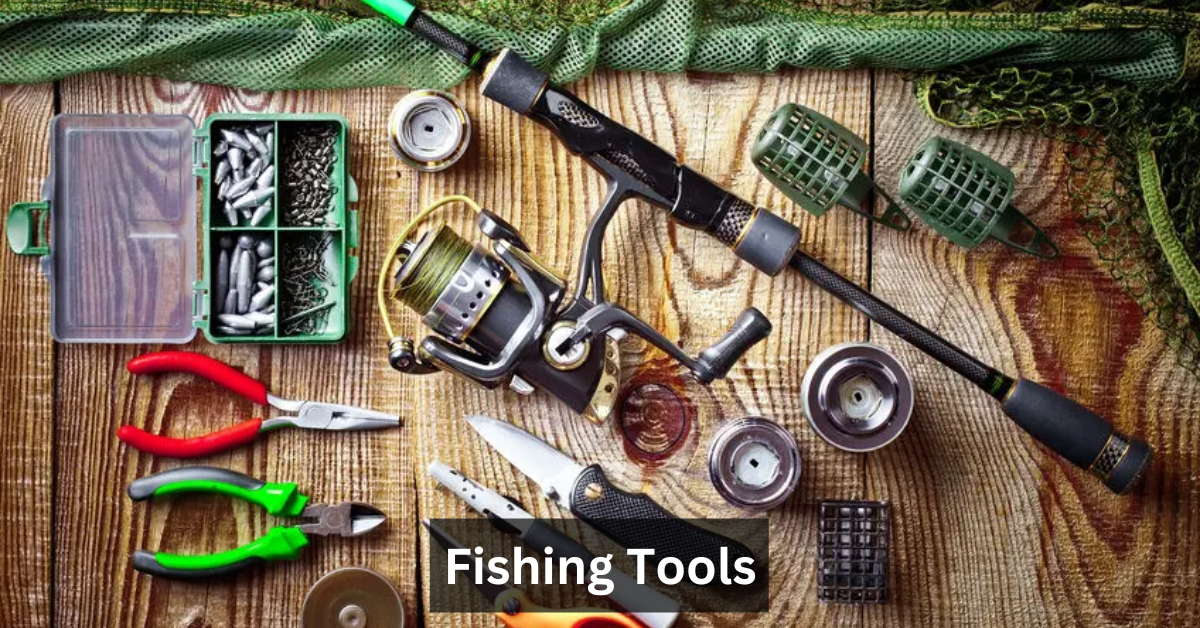Tackle includes bait, lures, and terminal gear, while Fishing Tools cover knives, pliers, finders, and other hardware used to aid the process. From beginner basics to advanced gear used by professionals, this guide dives deep into everything you need to know about choosing and using the best Fishing Tools. With insights on gear types, brands, accessories, and smart shopping strategies, you’ll gain a reliable foundation for success in any fishing environment.
Understanding what Fishing Tools are and how they function is the first step in mastering the sport. Fishing Tools refer to the wide range of equipment used to catch, land, manage, and process fish. These include rods, reels, hooks, lines, pliers, knives, tackle boxes, and even electronic gadgets like fish finders. Every angler—whether fly fishing in a quiet stream or trolling in saltwater—relies on these tools to get the job done. Having the right tools enhances your chances of catching fish while also improving safety, comfort, and efficiency during each outing.
Using the wrong tools can turn a relaxing fishing trip into a frustrating one. A rod that’s too stiff, a dull knife, or a tangled line can ruin your entire experience. Quality Fishing Tools provide ease of use, help you adapt to various fishing conditions, and maximize your effectiveness. For example, using a durable Fishing line suited to your target species ensures you won’t lose your catch. Likewise, ergonomic pliers and sharpened knives ensure fast, safe handling of hooks and fish. Ultimately, choosing the proper gear empowers both beginners and experts to fish with confidence and precision.
Essential Fishing Tools for Beginners
If you’re just starting out, assembling a simple but effective toolkit is key. A solid rod and reel combo, ideally a spinning setup, is the perfect starting point. These tools are versatile, easy to handle, and widely available in stores or online. Pair this with a beginner-friendly Fishing line, such as monofilament, which offers flexibility and ease of casting. Add in a small tackle box stocked with hooks of various sizes, sinkers, bobbers, and artificial bait, and you’re ready for your first fishing adventure. Tools like a compact fishing knife and fishing pliers round out your starter kit, helping with cutting lines and safely removing hooks from fish.
Building a Basic Tackle Box Setup
A reliable tackle box is the heart of your Fishing Tools collection. This is where all your smaller items are stored and organized. Opt for a tackle box from trusted brands like Plano, known for their durable, compartmentalized designs. Inside, you should have an assortment of lures, extra Fishing line, hooks, weights, bobbers, swivels, and artificial baits. Including a fishing multitool with features like scissors, a line cutter, and hook remover can save space and simplify your packing. Keeping your gear organized means more time fishing and less time searching for parts.
Advanced Fishing Tools for Seasoned Anglers
As you gain experience, you’ll want to upgrade your equipment. Professional anglers often rely on specialized rods and reels tailored to specific fish species or techniques. For example, baitcasting rods, jigging rods, and telescopic rods offer advanced performance for different environments. Brands like Shimano, Abu Garcia, and KastKing deliver top-quality gear for seasoned anglers. These tools are designed for greater casting distance, line control, and hook-setting power. Investing in a sonar-powered fish finder, like those available at Cabela’s or Bass Pro Shops, enhances your efficiency by locating schools of fish quickly and accurately.
Freshwater vs. Saltwater Fishing Tools
Fishing in freshwater and saltwater environments requires different gear due to varying conditions and target species. Freshwater Fishing Tools are typically lighter and more flexible, suitable for fish like bass, trout, or catfish. A spinning rod and standard Fishing line are usually sufficient. In contrast, saltwater Fishing Tools must be corrosion-resistant, heavier-duty, and more robust to handle large, powerful species. Tools from Penn Fishing are ideal for saltwater, offering reels and rods that withstand the ocean’s harsh conditions. Always rinse your gear after saltwater use to maintain its longevity.
Fly Fishing, Ice Fishing, and Technique-Based Tools
Your choice of Fishing Tools should also reflect your preferred fishing technique. Fishing Tools for fly fishing include fly rods, floating lines, fake flies, and forceps—designed for precise casting and visual angling finesse. Ice Fishing Tools, on the other hand, require specialized gear like augers, tip-ups, insulated tackle boxes, and compact rods for handling frozen conditions. Surf fishing involves long rods, heavy sinkers, and sand spikes to handle the surf’s force. Meanwhile, jigging and trolling require specific rod flex, reel gear ratios, and terminal tackle for success in deeper or moving waters.
Top Fishing Tool Brands You Can Trust
When it comes to buying Fishing Tools, brand reputation matters. Shimano, Abu Garcia, and Rapala have earned global recognition for producing reliable gear that performs in all environments. KastKing delivers innovation at competitive prices, ideal for budget-conscious anglers. Penn Fishing is a go-to for saltwater gear, while Berkley leads in bait, line, and accessories. When selecting gear, stick with brands known for consistency, quality materials, and solid warranties. Reading reviews on platforms like Fishing Tackle Retailer or consulting the American Sportfishing Association can help you make informed purchases.
Fishing Tool Kits: What You Should Know
Pre-assembled fishing tool kits are perfect for beginners and travelers alike. These kits usually include the essentials: pliers, knives, hook removers, line cutters, and sometimes a multitool. Brands like Dr. Slick offer high-quality, compact kits tailored to different fishing styles. For a more personalized approach, you can build your own kit to match your target species and local conditions. The advantage of customizing is ensuring every piece serves a purpose. Whether store-bought or DIY, a good tool kit should be portable, durable, and ready for action.
Maintaining and Storing Your Fishing Tools
Proper maintenance extends the life and effectiveness of your Fishing Tools. After each use—especially in saltwater—rinse rods, reels, and metal tools with freshwater and dry thoroughly. Apply lubricant to reel components and check the sharpness of your fishing knife regularly. Keep your tackle box organized and replace any rusty or damaged items immediately. Use protective cases or wall-mounted storage racks for rods and store lures in plastic compartments. Seasonal cleaning and routine inspections prevent corrosion, reduce malfunction, and ensure you’re always ready to fish.
Buying the Best Fishing Tools: What to Consider
Choosing the right Fishing Tools involves more than just picking what’s popular. Consider your budget, experience level, target species, and fishing location. Do you need tools for occasional weekend trips or intensive offshore expeditions? Are you fishing from a boat, pier, or the shore? Shopping in-store allows you to test products firsthand, while online stores offer broader variety and reviews. Top platforms like Bass Pro Shops or Cabela’s also provide kits and bundles for added savings.
Budget-Friendly Fishing Tools That Work
You don’t need to break the bank to build a reliable Fishing Tools collection. Many entry-level rods, pliers, and tackle sets under $50 work exceptionally well for recreational use. Check for discounts and bundle deals online. KastKing and Berkley frequently offer budget gear that still meets quality standards. Local sales, clearance events, and seasonal promotions can help you stock up without overspending.
Must-Have Fishing Accessories
Beyond rods and reels, accessories like fish scalers, grippers, bobbers, floats, and weights are crucial to fishing success. Fishing pliers help you dehook safely, while line cutters save time and prevent frustration. Add a digital fish scale to weigh your catch or a drag system tool to adjust reel resistance. These accessories may be small, but they play big roles in your angling results.
Avoiding Common Mistakes with Fishing Tools
Many anglers—especially beginners—struggle with mismatched gear, improper setup, or lack of maintenance. Using a rod not rated for your target fish, for example, leads to breakage or poor hook sets. Failing to rinse saltwater gear causes rust and corrosion. Forgetting to replace old Fishing line can result in lost catches. Understanding your tools, reading product manuals, and doing regular upkeep avoids these common pitfalls and makes every trip more productive.
New Innovations in Fishing Tools
The world of Fishing Tools continues to evolve with smart gadgets and sustainable materials. Wearable tech like smartwatches now sync with GPS and sonar tools to guide your fishing decisions. Mobile apps provide water temperature, fish forecasts, and location tracking. Brands are also developing eco-friendly baits and biodegradable line materials to reduce environmental impact. Staying updated on innovation keeps you ahead of the curve and improves your fishing efficiency.
Conclusion
The best Fishing Tools are the ones that suit your goals, style, and environment. Start with the basics, learn what works for you, and upgrade gradually as you gain experience. Keep your tools clean, organized, and ready for use. Whether you’re enjoying a quiet freshwater lake or battling big game in the surf, the right tools turn fishing into an adventure of skill, patience, and reward. Trust in quality brands, stay informed, and invest in gear that makes every cast count.
Frequently Asked Questions
Can I use the same tools for freshwater and saltwater?
Some tools work in both, but saltwater Fishing Tools must be corrosion-resistant and stronger.
How often should I replace my Fishing line?
Replace your Fishing line every season or after heavy use, especially if it shows signs of wear or memory.
What are the best tools for night fishing?
LED headlamps, glow-in-the-dark bobbers, and tackle with light-reflective properties are perfect for night sessions.
Are combo kits worth it for beginners?
Yes, combo kits offer convenience and are cost-effective, especially for those learning what works best for their style.
Stay in touch to get more updates & alerts on Erome! Thank you



